CSR, Business Ethics & Sustainability in the Clothing Industry
VerifiedAdded on 2023/06/18
|11
|3926
|79
Report
AI Summary
This report delves into the critical aspects of business ethics, corporate social responsibility (CSR), and sustainability within the clothing sector. It identifies and discusses key challenges related to CSR and sustainability, such as low wages, child labor, environmental degradation, animal cruelty, and health and safety risks. The report also analyzes best practices adopted by the clothing sector to address ethical and moral issues, including ensuring ethical leadership and establishing robust ethical standards. Furthermore, it provides recommendations for clothing businesses to enhance their responsibility by considering global implications, emphasizing the importance of ethical behavior, environmental protection, and social welfare to achieve long-term sustainability and a positive market image. Desklib provides access to similar solved assignments and past papers for students.
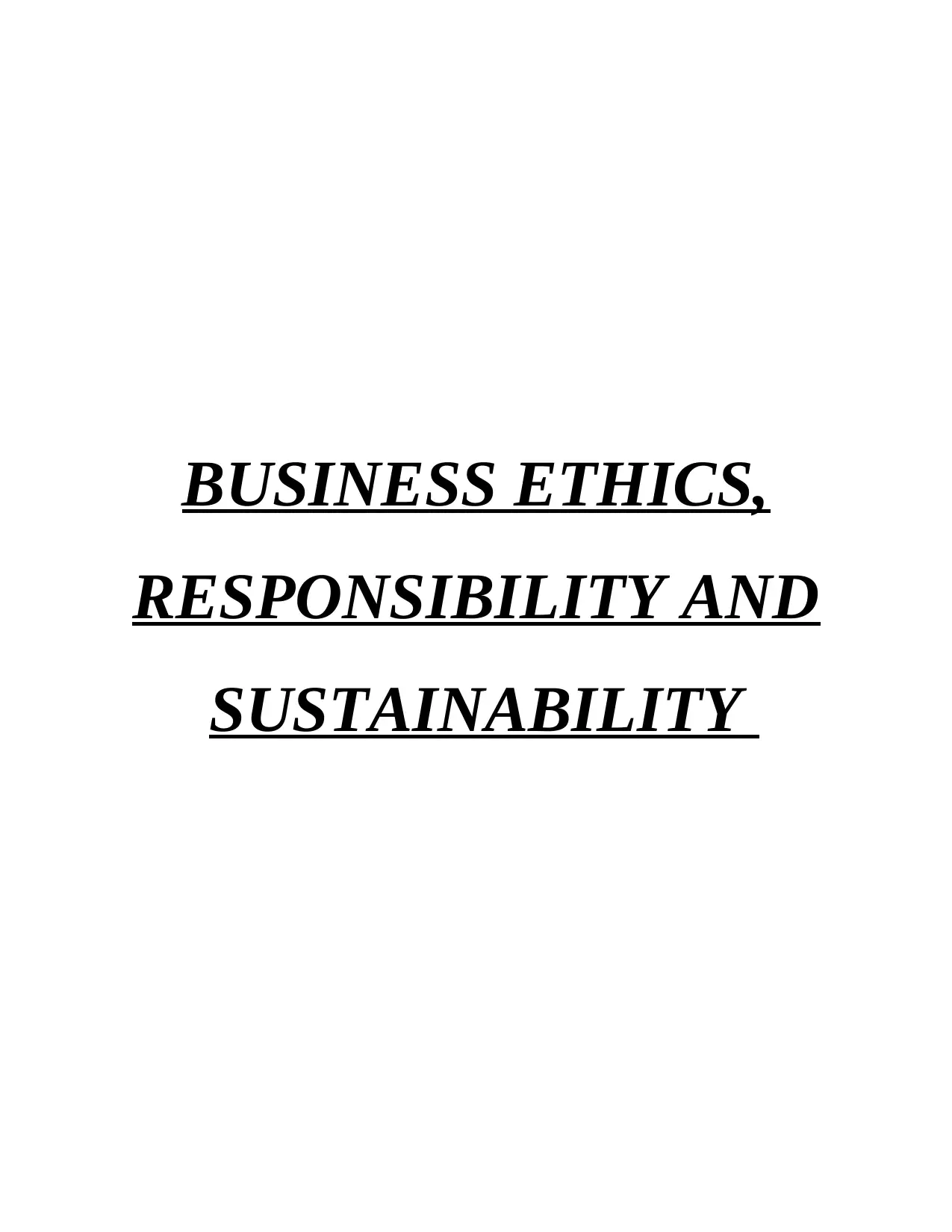
BUSINESS ETHICS,
RESPONSIBILITY AND
SUSTAINABILITY
RESPONSIBILITY AND
SUSTAINABILITY
Paraphrase This Document
Need a fresh take? Get an instant paraphrase of this document with our AI Paraphraser
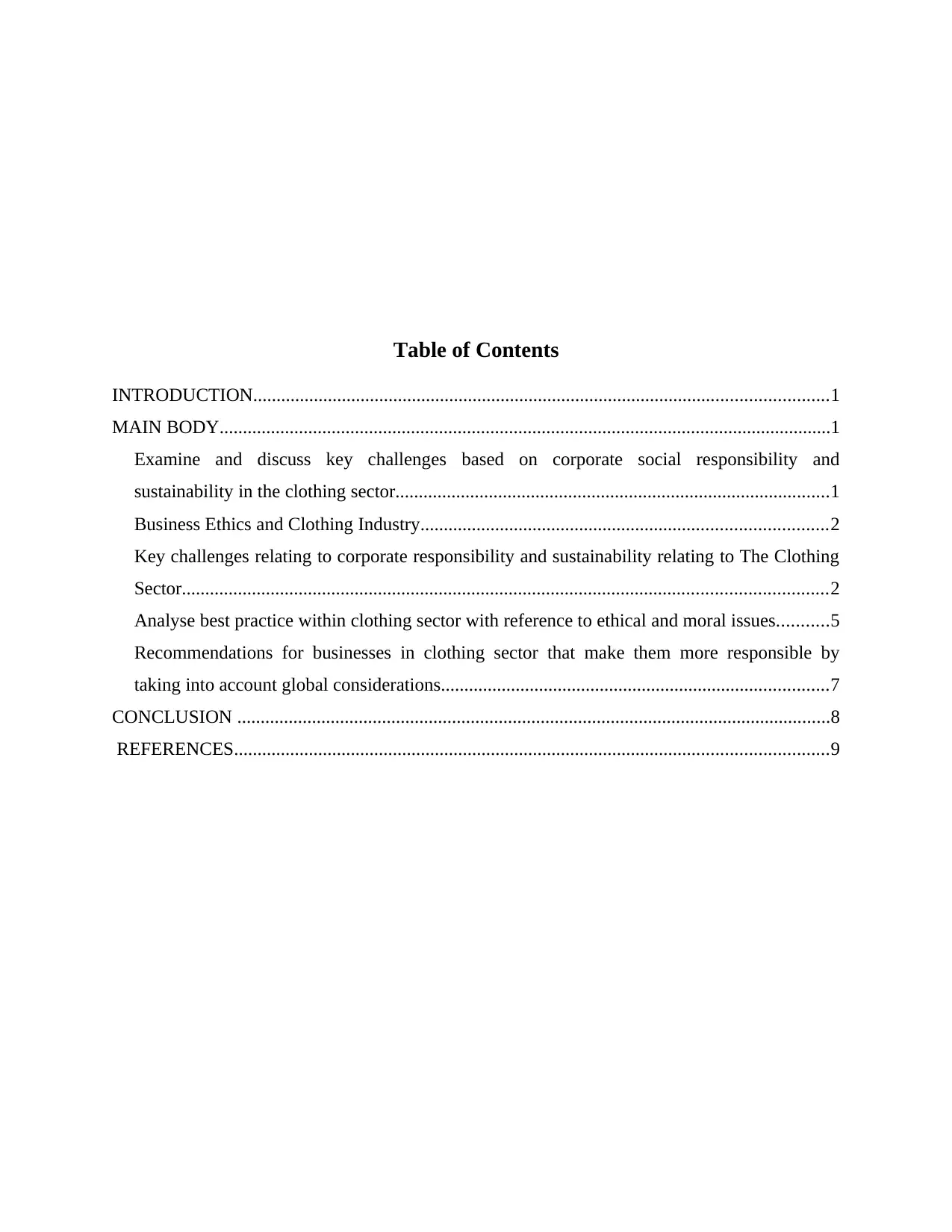
Table of Contents
INTRODUCTION...........................................................................................................................1
MAIN BODY...................................................................................................................................1
Examine and discuss key challenges based on corporate social responsibility and
sustainability in the clothing sector.............................................................................................1
Business Ethics and Clothing Industry.......................................................................................2
Key challenges relating to corporate responsibility and sustainability relating to The Clothing
Sector..........................................................................................................................................2
Analyse best practice within clothing sector with reference to ethical and moral issues...........5
Recommendations for businesses in clothing sector that make them more responsible by
taking into account global considerations...................................................................................7
CONCLUSION ...............................................................................................................................8
REFERENCES...............................................................................................................................9
INTRODUCTION...........................................................................................................................1
MAIN BODY...................................................................................................................................1
Examine and discuss key challenges based on corporate social responsibility and
sustainability in the clothing sector.............................................................................................1
Business Ethics and Clothing Industry.......................................................................................2
Key challenges relating to corporate responsibility and sustainability relating to The Clothing
Sector..........................................................................................................................................2
Analyse best practice within clothing sector with reference to ethical and moral issues...........5
Recommendations for businesses in clothing sector that make them more responsible by
taking into account global considerations...................................................................................7
CONCLUSION ...............................................................................................................................8
REFERENCES...............................................................................................................................9
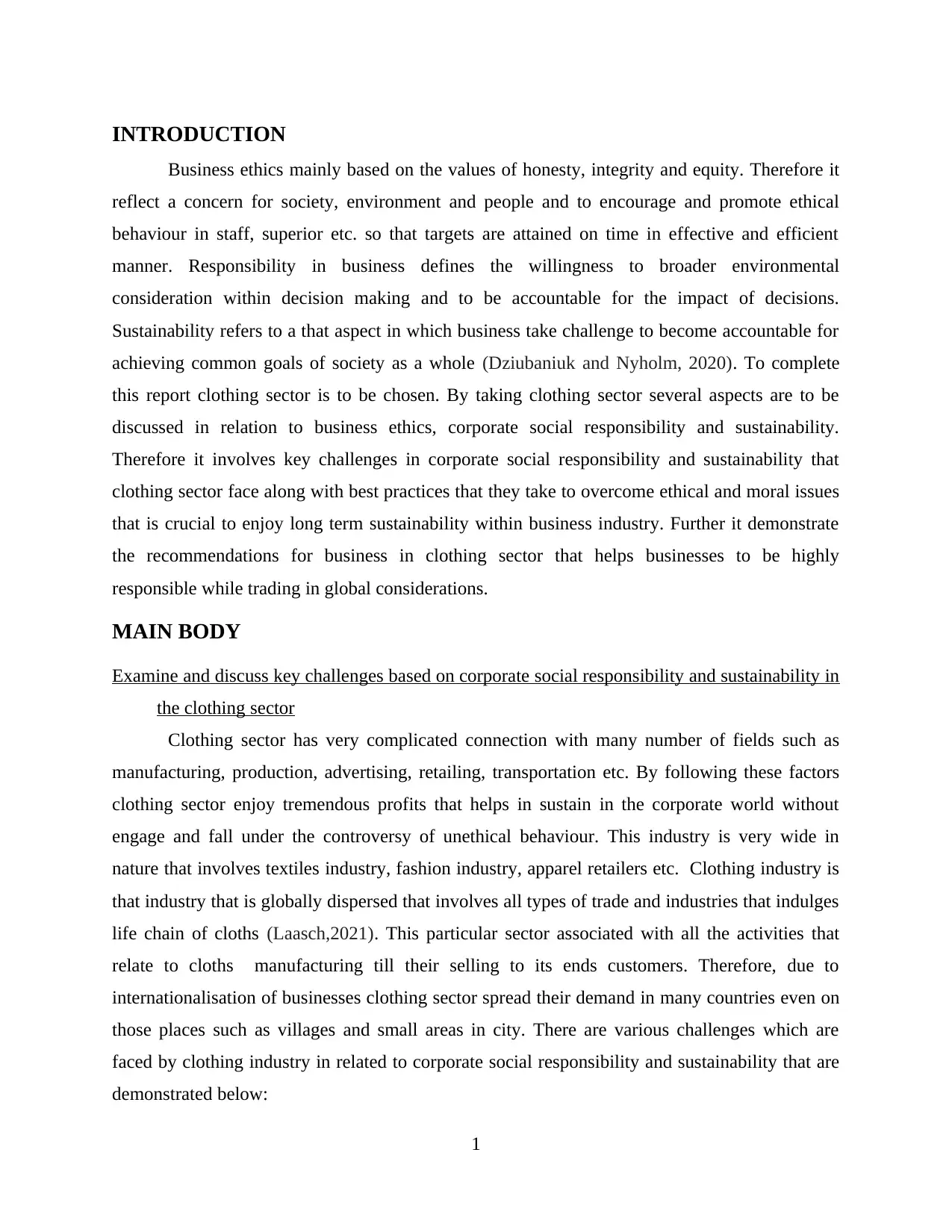
INTRODUCTION
Business ethics mainly based on the values of honesty, integrity and equity. Therefore it
reflect a concern for society, environment and people and to encourage and promote ethical
behaviour in staff, superior etc. so that targets are attained on time in effective and efficient
manner. Responsibility in business defines the willingness to broader environmental
consideration within decision making and to be accountable for the impact of decisions.
Sustainability refers to a that aspect in which business take challenge to become accountable for
achieving common goals of society as a whole (Dziubaniuk and Nyholm, 2020). To complete
this report clothing sector is to be chosen. By taking clothing sector several aspects are to be
discussed in relation to business ethics, corporate social responsibility and sustainability.
Therefore it involves key challenges in corporate social responsibility and sustainability that
clothing sector face along with best practices that they take to overcome ethical and moral issues
that is crucial to enjoy long term sustainability within business industry. Further it demonstrate
the recommendations for business in clothing sector that helps businesses to be highly
responsible while trading in global considerations.
MAIN BODY
Examine and discuss key challenges based on corporate social responsibility and sustainability in
the clothing sector
Clothing sector has very complicated connection with many number of fields such as
manufacturing, production, advertising, retailing, transportation etc. By following these factors
clothing sector enjoy tremendous profits that helps in sustain in the corporate world without
engage and fall under the controversy of unethical behaviour. This industry is very wide in
nature that involves textiles industry, fashion industry, apparel retailers etc. Clothing industry is
that industry that is globally dispersed that involves all types of trade and industries that indulges
life chain of cloths (Laasch,2021). This particular sector associated with all the activities that
relate to cloths manufacturing till their selling to its ends customers. Therefore, due to
internationalisation of businesses clothing sector spread their demand in many countries even on
those places such as villages and small areas in city. There are various challenges which are
faced by clothing industry in related to corporate social responsibility and sustainability that are
demonstrated below:
1
Business ethics mainly based on the values of honesty, integrity and equity. Therefore it
reflect a concern for society, environment and people and to encourage and promote ethical
behaviour in staff, superior etc. so that targets are attained on time in effective and efficient
manner. Responsibility in business defines the willingness to broader environmental
consideration within decision making and to be accountable for the impact of decisions.
Sustainability refers to a that aspect in which business take challenge to become accountable for
achieving common goals of society as a whole (Dziubaniuk and Nyholm, 2020). To complete
this report clothing sector is to be chosen. By taking clothing sector several aspects are to be
discussed in relation to business ethics, corporate social responsibility and sustainability.
Therefore it involves key challenges in corporate social responsibility and sustainability that
clothing sector face along with best practices that they take to overcome ethical and moral issues
that is crucial to enjoy long term sustainability within business industry. Further it demonstrate
the recommendations for business in clothing sector that helps businesses to be highly
responsible while trading in global considerations.
MAIN BODY
Examine and discuss key challenges based on corporate social responsibility and sustainability in
the clothing sector
Clothing sector has very complicated connection with many number of fields such as
manufacturing, production, advertising, retailing, transportation etc. By following these factors
clothing sector enjoy tremendous profits that helps in sustain in the corporate world without
engage and fall under the controversy of unethical behaviour. This industry is very wide in
nature that involves textiles industry, fashion industry, apparel retailers etc. Clothing industry is
that industry that is globally dispersed that involves all types of trade and industries that indulges
life chain of cloths (Laasch,2021). This particular sector associated with all the activities that
relate to cloths manufacturing till their selling to its ends customers. Therefore, due to
internationalisation of businesses clothing sector spread their demand in many countries even on
those places such as villages and small areas in city. There are various challenges which are
faced by clothing industry in related to corporate social responsibility and sustainability that are
demonstrated below:
1
⊘ This is a preview!⊘
Do you want full access?
Subscribe today to unlock all pages.

Trusted by 1+ million students worldwide
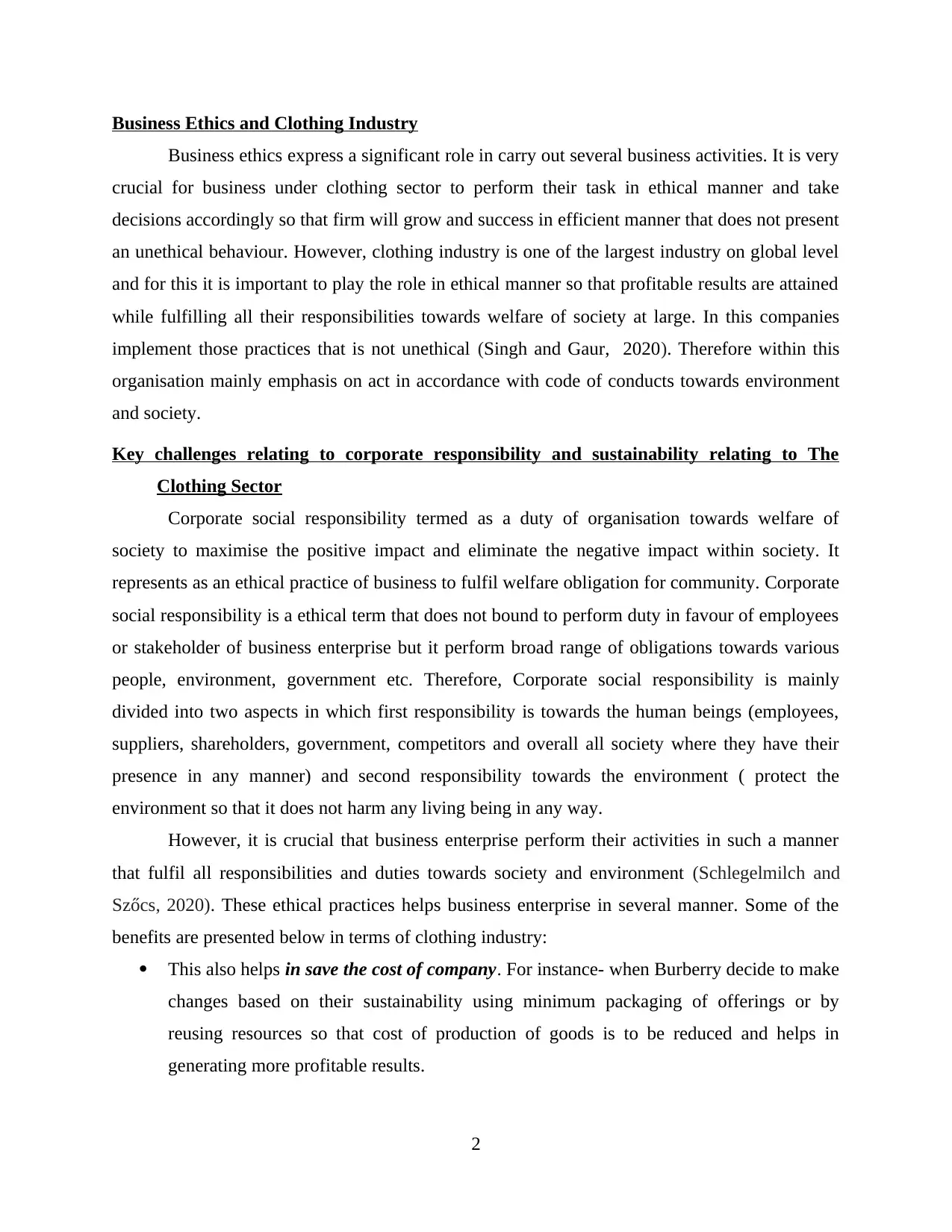
Business Ethics and Clothing Industry
Business ethics express a significant role in carry out several business activities. It is very
crucial for business under clothing sector to perform their task in ethical manner and take
decisions accordingly so that firm will grow and success in efficient manner that does not present
an unethical behaviour. However, clothing industry is one of the largest industry on global level
and for this it is important to play the role in ethical manner so that profitable results are attained
while fulfilling all their responsibilities towards welfare of society at large. In this companies
implement those practices that is not unethical (Singh and Gaur, 2020). Therefore within this
organisation mainly emphasis on act in accordance with code of conducts towards environment
and society.
Key challenges relating to corporate responsibility and sustainability relating to The
Clothing Sector
Corporate social responsibility termed as a duty of organisation towards welfare of
society to maximise the positive impact and eliminate the negative impact within society. It
represents as an ethical practice of business to fulfil welfare obligation for community. Corporate
social responsibility is a ethical term that does not bound to perform duty in favour of employees
or stakeholder of business enterprise but it perform broad range of obligations towards various
people, environment, government etc. Therefore, Corporate social responsibility is mainly
divided into two aspects in which first responsibility is towards the human beings (employees,
suppliers, shareholders, government, competitors and overall all society where they have their
presence in any manner) and second responsibility towards the environment ( protect the
environment so that it does not harm any living being in any way.
However, it is crucial that business enterprise perform their activities in such a manner
that fulfil all responsibilities and duties towards society and environment (Schlegelmilch and
Szőcs, 2020). These ethical practices helps business enterprise in several manner. Some of the
benefits are presented below in terms of clothing industry:
This also helps in save the cost of company. For instance- when Burberry decide to make
changes based on their sustainability using minimum packaging of offerings or by
reusing resources so that cost of production of goods is to be reduced and helps in
generating more profitable results.
2
Business ethics express a significant role in carry out several business activities. It is very
crucial for business under clothing sector to perform their task in ethical manner and take
decisions accordingly so that firm will grow and success in efficient manner that does not present
an unethical behaviour. However, clothing industry is one of the largest industry on global level
and for this it is important to play the role in ethical manner so that profitable results are attained
while fulfilling all their responsibilities towards welfare of society at large. In this companies
implement those practices that is not unethical (Singh and Gaur, 2020). Therefore within this
organisation mainly emphasis on act in accordance with code of conducts towards environment
and society.
Key challenges relating to corporate responsibility and sustainability relating to The
Clothing Sector
Corporate social responsibility termed as a duty of organisation towards welfare of
society to maximise the positive impact and eliminate the negative impact within society. It
represents as an ethical practice of business to fulfil welfare obligation for community. Corporate
social responsibility is a ethical term that does not bound to perform duty in favour of employees
or stakeholder of business enterprise but it perform broad range of obligations towards various
people, environment, government etc. Therefore, Corporate social responsibility is mainly
divided into two aspects in which first responsibility is towards the human beings (employees,
suppliers, shareholders, government, competitors and overall all society where they have their
presence in any manner) and second responsibility towards the environment ( protect the
environment so that it does not harm any living being in any way.
However, it is crucial that business enterprise perform their activities in such a manner
that fulfil all responsibilities and duties towards society and environment (Schlegelmilch and
Szőcs, 2020). These ethical practices helps business enterprise in several manner. Some of the
benefits are presented below in terms of clothing industry:
This also helps in save the cost of company. For instance- when Burberry decide to make
changes based on their sustainability using minimum packaging of offerings or by
reusing resources so that cost of production of goods is to be reduced and helps in
generating more profitable results.
2
Paraphrase This Document
Need a fresh take? Get an instant paraphrase of this document with our AI Paraphraser
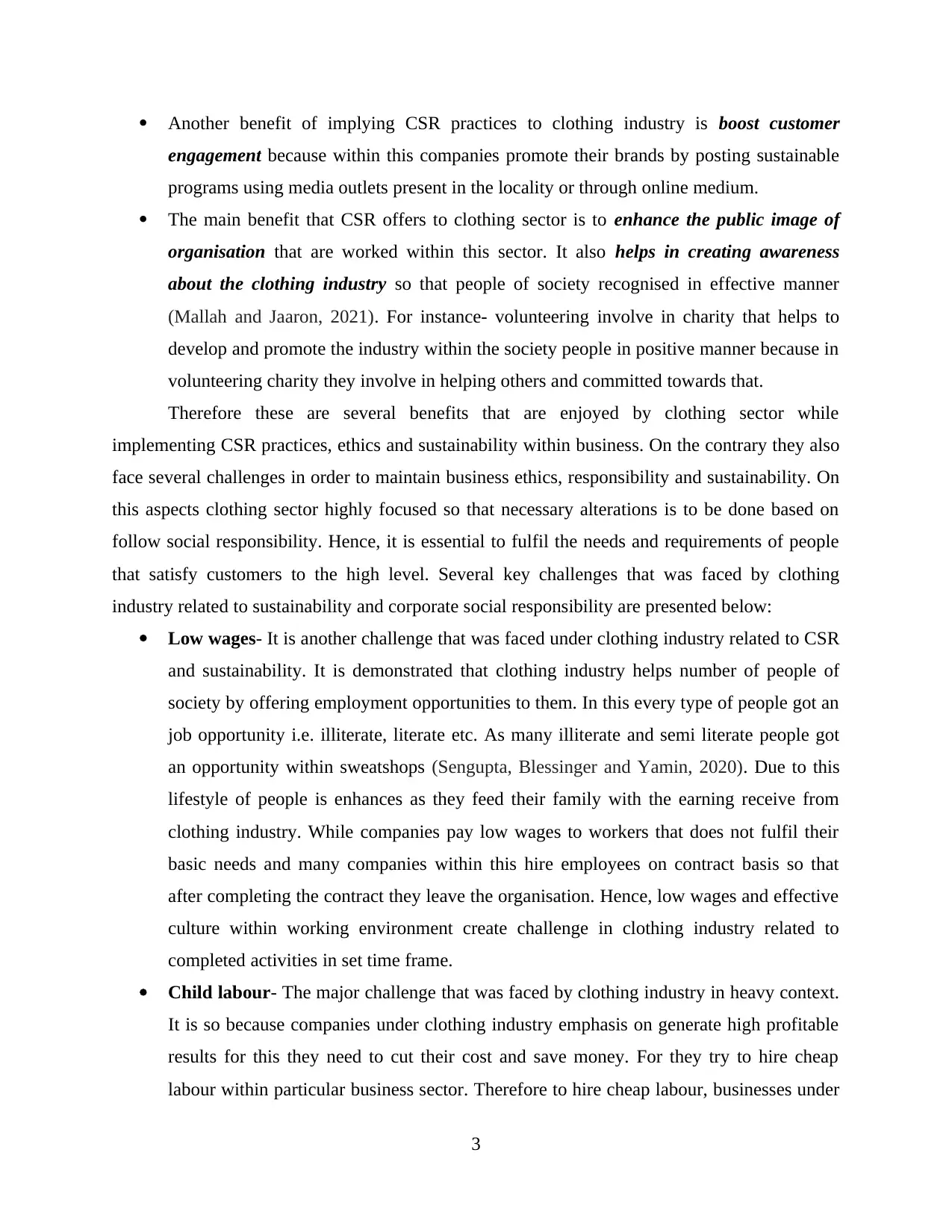
Another benefit of implying CSR practices to clothing industry is boost customer
engagement because within this companies promote their brands by posting sustainable
programs using media outlets present in the locality or through online medium.
The main benefit that CSR offers to clothing sector is to enhance the public image of
organisation that are worked within this sector. It also helps in creating awareness
about the clothing industry so that people of society recognised in effective manner
(Mallah and Jaaron, 2021). For instance- volunteering involve in charity that helps to
develop and promote the industry within the society people in positive manner because in
volunteering charity they involve in helping others and committed towards that.
Therefore these are several benefits that are enjoyed by clothing sector while
implementing CSR practices, ethics and sustainability within business. On the contrary they also
face several challenges in order to maintain business ethics, responsibility and sustainability. On
this aspects clothing sector highly focused so that necessary alterations is to be done based on
follow social responsibility. Hence, it is essential to fulfil the needs and requirements of people
that satisfy customers to the high level. Several key challenges that was faced by clothing
industry related to sustainability and corporate social responsibility are presented below:
Low wages- It is another challenge that was faced under clothing industry related to CSR
and sustainability. It is demonstrated that clothing industry helps number of people of
society by offering employment opportunities to them. In this every type of people got an
job opportunity i.e. illiterate, literate etc. As many illiterate and semi literate people got
an opportunity within sweatshops (Sengupta, Blessinger and Yamin, 2020). Due to this
lifestyle of people is enhances as they feed their family with the earning receive from
clothing industry. While companies pay low wages to workers that does not fulfil their
basic needs and many companies within this hire employees on contract basis so that
after completing the contract they leave the organisation. Hence, low wages and effective
culture within working environment create challenge in clothing industry related to
completed activities in set time frame.
Child labour- The major challenge that was faced by clothing industry in heavy context.
It is so because companies under clothing industry emphasis on generate high profitable
results for this they need to cut their cost and save money. For they try to hire cheap
labour within particular business sector. Therefore to hire cheap labour, businesses under
3
engagement because within this companies promote their brands by posting sustainable
programs using media outlets present in the locality or through online medium.
The main benefit that CSR offers to clothing sector is to enhance the public image of
organisation that are worked within this sector. It also helps in creating awareness
about the clothing industry so that people of society recognised in effective manner
(Mallah and Jaaron, 2021). For instance- volunteering involve in charity that helps to
develop and promote the industry within the society people in positive manner because in
volunteering charity they involve in helping others and committed towards that.
Therefore these are several benefits that are enjoyed by clothing sector while
implementing CSR practices, ethics and sustainability within business. On the contrary they also
face several challenges in order to maintain business ethics, responsibility and sustainability. On
this aspects clothing sector highly focused so that necessary alterations is to be done based on
follow social responsibility. Hence, it is essential to fulfil the needs and requirements of people
that satisfy customers to the high level. Several key challenges that was faced by clothing
industry related to sustainability and corporate social responsibility are presented below:
Low wages- It is another challenge that was faced under clothing industry related to CSR
and sustainability. It is demonstrated that clothing industry helps number of people of
society by offering employment opportunities to them. In this every type of people got an
job opportunity i.e. illiterate, literate etc. As many illiterate and semi literate people got
an opportunity within sweatshops (Sengupta, Blessinger and Yamin, 2020). Due to this
lifestyle of people is enhances as they feed their family with the earning receive from
clothing industry. While companies pay low wages to workers that does not fulfil their
basic needs and many companies within this hire employees on contract basis so that
after completing the contract they leave the organisation. Hence, low wages and effective
culture within working environment create challenge in clothing industry related to
completed activities in set time frame.
Child labour- The major challenge that was faced by clothing industry in heavy context.
It is so because companies under clothing industry emphasis on generate high profitable
results for this they need to cut their cost and save money. For they try to hire cheap
labour within particular business sector. Therefore to hire cheap labour, businesses under
3
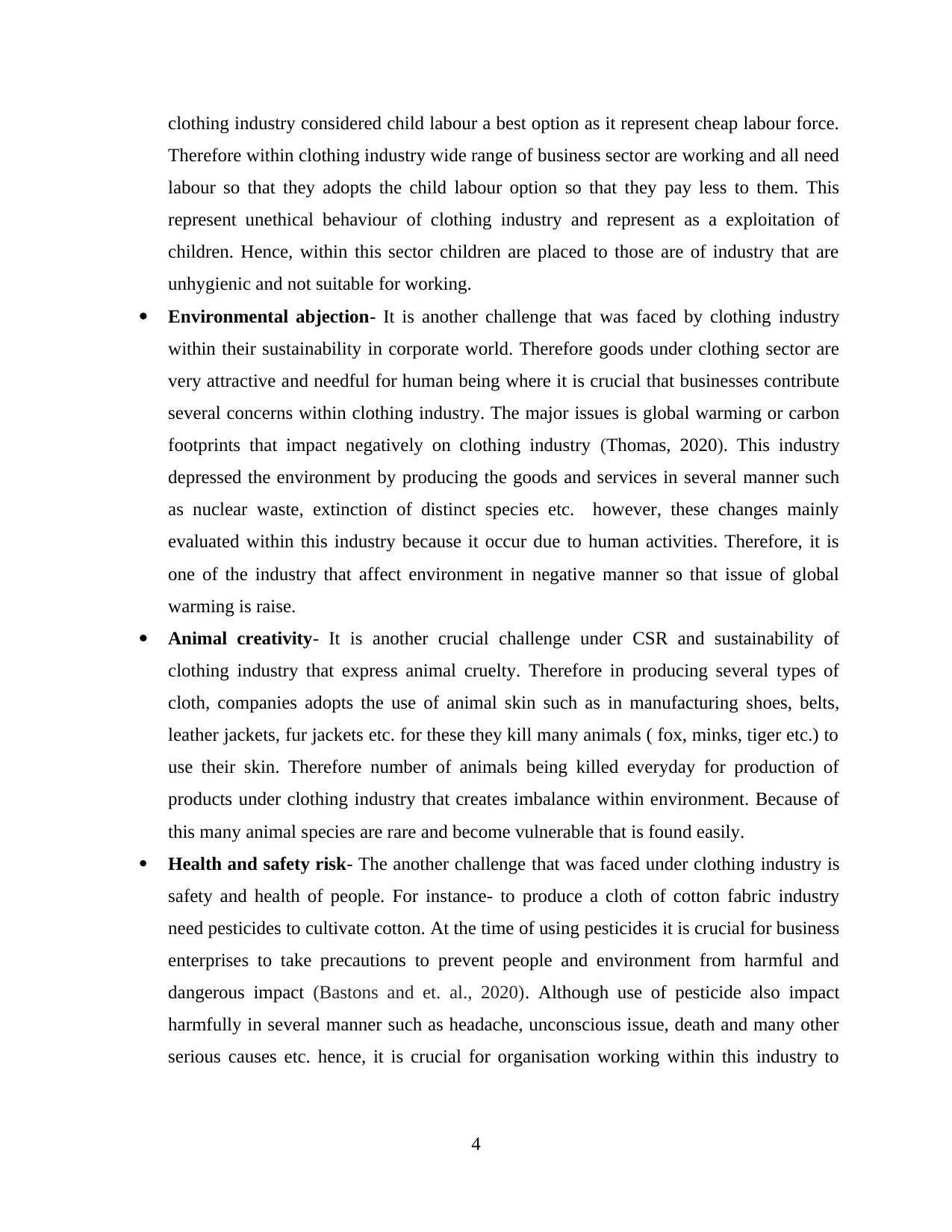
clothing industry considered child labour a best option as it represent cheap labour force.
Therefore within clothing industry wide range of business sector are working and all need
labour so that they adopts the child labour option so that they pay less to them. This
represent unethical behaviour of clothing industry and represent as a exploitation of
children. Hence, within this sector children are placed to those are of industry that are
unhygienic and not suitable for working.
Environmental abjection- It is another challenge that was faced by clothing industry
within their sustainability in corporate world. Therefore goods under clothing sector are
very attractive and needful for human being where it is crucial that businesses contribute
several concerns within clothing industry. The major issues is global warming or carbon
footprints that impact negatively on clothing industry (Thomas, 2020). This industry
depressed the environment by producing the goods and services in several manner such
as nuclear waste, extinction of distinct species etc. however, these changes mainly
evaluated within this industry because it occur due to human activities. Therefore, it is
one of the industry that affect environment in negative manner so that issue of global
warming is raise.
Animal creativity- It is another crucial challenge under CSR and sustainability of
clothing industry that express animal cruelty. Therefore in producing several types of
cloth, companies adopts the use of animal skin such as in manufacturing shoes, belts,
leather jackets, fur jackets etc. for these they kill many animals ( fox, minks, tiger etc.) to
use their skin. Therefore number of animals being killed everyday for production of
products under clothing industry that creates imbalance within environment. Because of
this many animal species are rare and become vulnerable that is found easily.
Health and safety risk- The another challenge that was faced under clothing industry is
safety and health of people. For instance- to produce a cloth of cotton fabric industry
need pesticides to cultivate cotton. At the time of using pesticides it is crucial for business
enterprises to take precautions to prevent people and environment from harmful and
dangerous impact (Bastons and et. al., 2020). Although use of pesticide also impact
harmfully in several manner such as headache, unconscious issue, death and many other
serious causes etc. hence, it is crucial for organisation working within this industry to
4
Therefore within clothing industry wide range of business sector are working and all need
labour so that they adopts the child labour option so that they pay less to them. This
represent unethical behaviour of clothing industry and represent as a exploitation of
children. Hence, within this sector children are placed to those are of industry that are
unhygienic and not suitable for working.
Environmental abjection- It is another challenge that was faced by clothing industry
within their sustainability in corporate world. Therefore goods under clothing sector are
very attractive and needful for human being where it is crucial that businesses contribute
several concerns within clothing industry. The major issues is global warming or carbon
footprints that impact negatively on clothing industry (Thomas, 2020). This industry
depressed the environment by producing the goods and services in several manner such
as nuclear waste, extinction of distinct species etc. however, these changes mainly
evaluated within this industry because it occur due to human activities. Therefore, it is
one of the industry that affect environment in negative manner so that issue of global
warming is raise.
Animal creativity- It is another crucial challenge under CSR and sustainability of
clothing industry that express animal cruelty. Therefore in producing several types of
cloth, companies adopts the use of animal skin such as in manufacturing shoes, belts,
leather jackets, fur jackets etc. for these they kill many animals ( fox, minks, tiger etc.) to
use their skin. Therefore number of animals being killed everyday for production of
products under clothing industry that creates imbalance within environment. Because of
this many animal species are rare and become vulnerable that is found easily.
Health and safety risk- The another challenge that was faced under clothing industry is
safety and health of people. For instance- to produce a cloth of cotton fabric industry
need pesticides to cultivate cotton. At the time of using pesticides it is crucial for business
enterprises to take precautions to prevent people and environment from harmful and
dangerous impact (Bastons and et. al., 2020). Although use of pesticide also impact
harmfully in several manner such as headache, unconscious issue, death and many other
serious causes etc. hence, it is crucial for organisation working within this industry to
4
⊘ This is a preview!⊘
Do you want full access?
Subscribe today to unlock all pages.

Trusted by 1+ million students worldwide
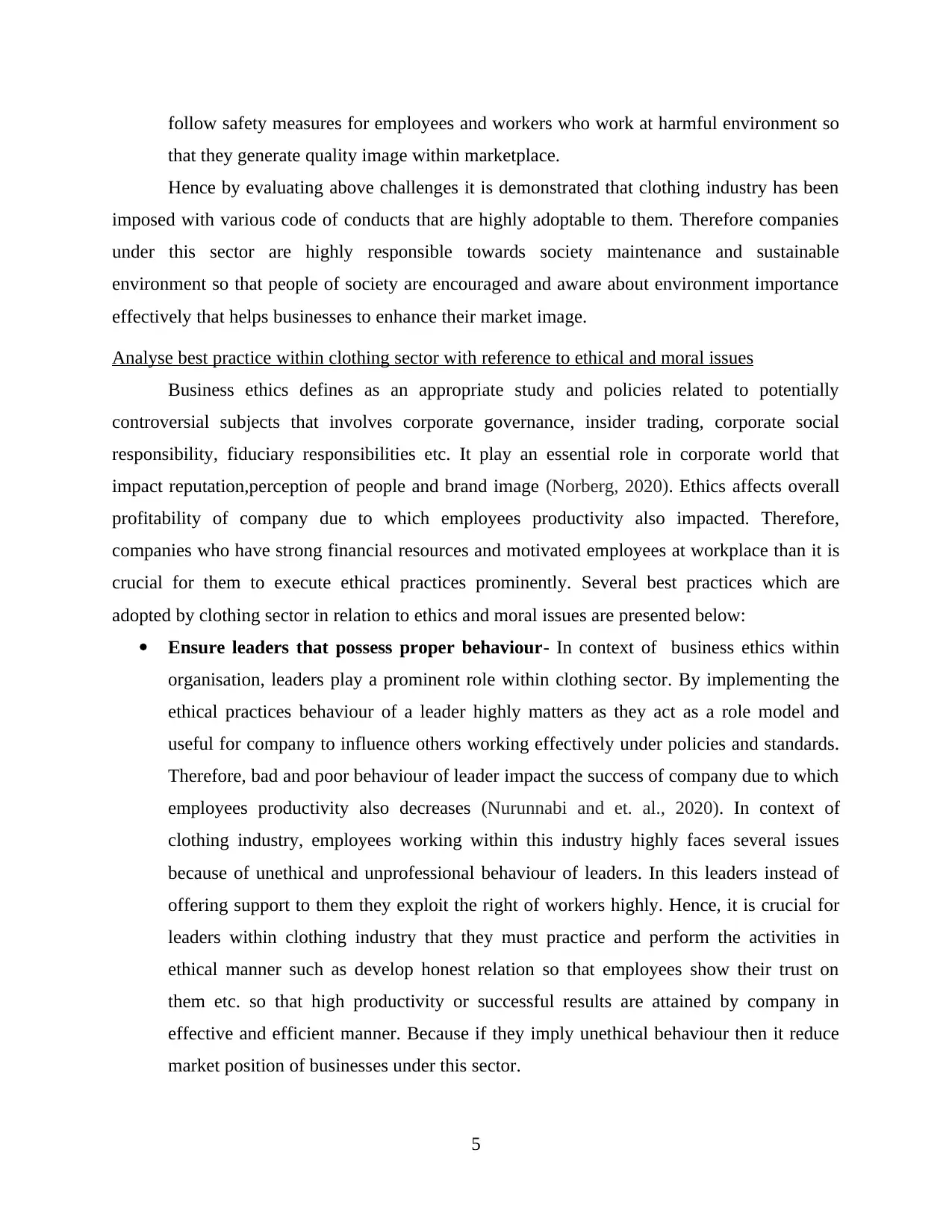
follow safety measures for employees and workers who work at harmful environment so
that they generate quality image within marketplace.
Hence by evaluating above challenges it is demonstrated that clothing industry has been
imposed with various code of conducts that are highly adoptable to them. Therefore companies
under this sector are highly responsible towards society maintenance and sustainable
environment so that people of society are encouraged and aware about environment importance
effectively that helps businesses to enhance their market image.
Analyse best practice within clothing sector with reference to ethical and moral issues
Business ethics defines as an appropriate study and policies related to potentially
controversial subjects that involves corporate governance, insider trading, corporate social
responsibility, fiduciary responsibilities etc. It play an essential role in corporate world that
impact reputation,perception of people and brand image (Norberg, 2020). Ethics affects overall
profitability of company due to which employees productivity also impacted. Therefore,
companies who have strong financial resources and motivated employees at workplace than it is
crucial for them to execute ethical practices prominently. Several best practices which are
adopted by clothing sector in relation to ethics and moral issues are presented below:
Ensure leaders that possess proper behaviour- In context of business ethics within
organisation, leaders play a prominent role within clothing sector. By implementing the
ethical practices behaviour of a leader highly matters as they act as a role model and
useful for company to influence others working effectively under policies and standards.
Therefore, bad and poor behaviour of leader impact the success of company due to which
employees productivity also decreases (Nurunnabi and et. al., 2020). In context of
clothing industry, employees working within this industry highly faces several issues
because of unethical and unprofessional behaviour of leaders. In this leaders instead of
offering support to them they exploit the right of workers highly. Hence, it is crucial for
leaders within clothing industry that they must practice and perform the activities in
ethical manner such as develop honest relation so that employees show their trust on
them etc. so that high productivity or successful results are attained by company in
effective and efficient manner. Because if they imply unethical behaviour then it reduce
market position of businesses under this sector.
5
that they generate quality image within marketplace.
Hence by evaluating above challenges it is demonstrated that clothing industry has been
imposed with various code of conducts that are highly adoptable to them. Therefore companies
under this sector are highly responsible towards society maintenance and sustainable
environment so that people of society are encouraged and aware about environment importance
effectively that helps businesses to enhance their market image.
Analyse best practice within clothing sector with reference to ethical and moral issues
Business ethics defines as an appropriate study and policies related to potentially
controversial subjects that involves corporate governance, insider trading, corporate social
responsibility, fiduciary responsibilities etc. It play an essential role in corporate world that
impact reputation,perception of people and brand image (Norberg, 2020). Ethics affects overall
profitability of company due to which employees productivity also impacted. Therefore,
companies who have strong financial resources and motivated employees at workplace than it is
crucial for them to execute ethical practices prominently. Several best practices which are
adopted by clothing sector in relation to ethics and moral issues are presented below:
Ensure leaders that possess proper behaviour- In context of business ethics within
organisation, leaders play a prominent role within clothing sector. By implementing the
ethical practices behaviour of a leader highly matters as they act as a role model and
useful for company to influence others working effectively under policies and standards.
Therefore, bad and poor behaviour of leader impact the success of company due to which
employees productivity also decreases (Nurunnabi and et. al., 2020). In context of
clothing industry, employees working within this industry highly faces several issues
because of unethical and unprofessional behaviour of leaders. In this leaders instead of
offering support to them they exploit the right of workers highly. Hence, it is crucial for
leaders within clothing industry that they must practice and perform the activities in
ethical manner such as develop honest relation so that employees show their trust on
them etc. so that high productivity or successful results are attained by company in
effective and efficient manner. Because if they imply unethical behaviour then it reduce
market position of businesses under this sector.
5
Paraphrase This Document
Need a fresh take? Get an instant paraphrase of this document with our AI Paraphraser
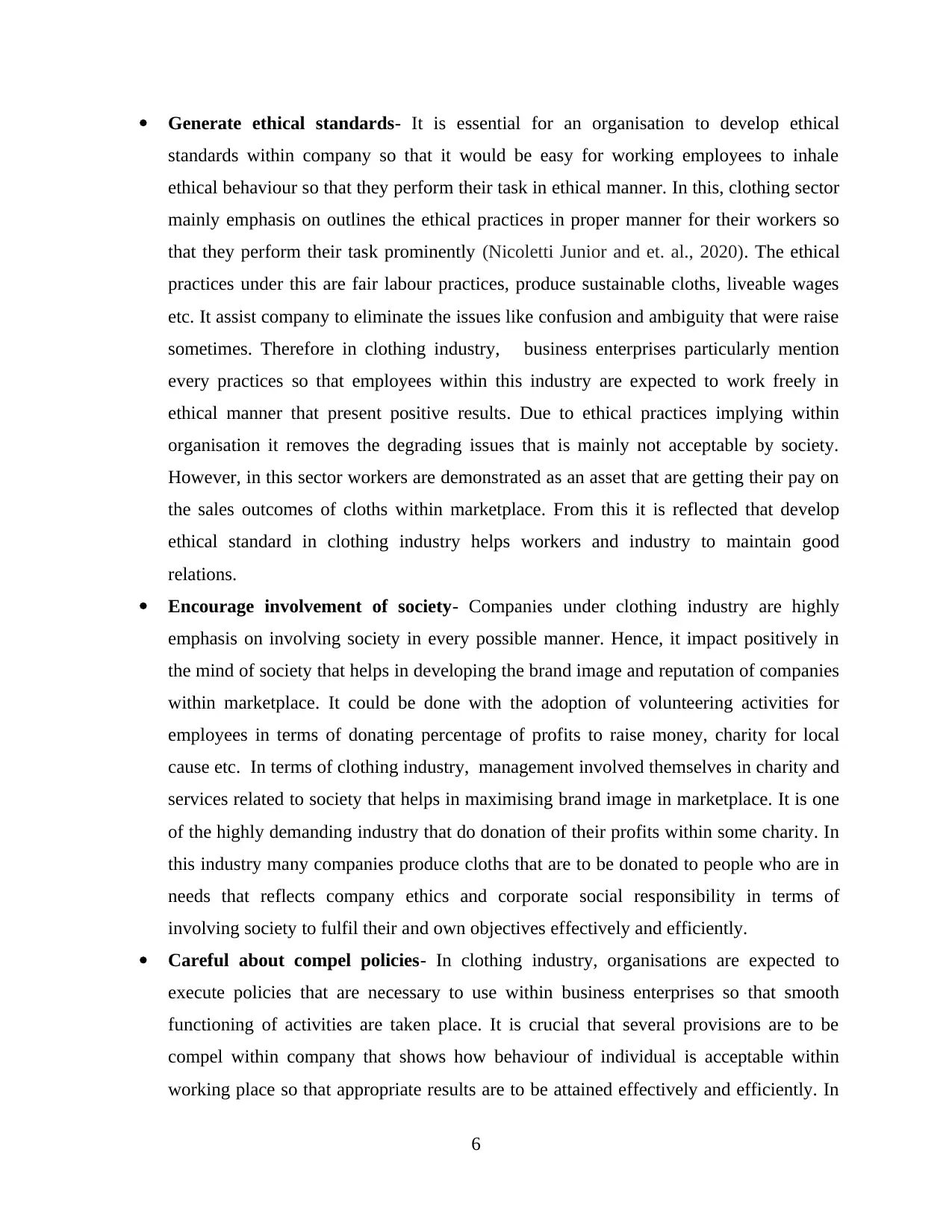
Generate ethical standards- It is essential for an organisation to develop ethical
standards within company so that it would be easy for working employees to inhale
ethical behaviour so that they perform their task in ethical manner. In this, clothing sector
mainly emphasis on outlines the ethical practices in proper manner for their workers so
that they perform their task prominently (Nicoletti Junior and et. al., 2020). The ethical
practices under this are fair labour practices, produce sustainable cloths, liveable wages
etc. It assist company to eliminate the issues like confusion and ambiguity that were raise
sometimes. Therefore in clothing industry, business enterprises particularly mention
every practices so that employees within this industry are expected to work freely in
ethical manner that present positive results. Due to ethical practices implying within
organisation it removes the degrading issues that is mainly not acceptable by society.
However, in this sector workers are demonstrated as an asset that are getting their pay on
the sales outcomes of cloths within marketplace. From this it is reflected that develop
ethical standard in clothing industry helps workers and industry to maintain good
relations.
Encourage involvement of society- Companies under clothing industry are highly
emphasis on involving society in every possible manner. Hence, it impact positively in
the mind of society that helps in developing the brand image and reputation of companies
within marketplace. It could be done with the adoption of volunteering activities for
employees in terms of donating percentage of profits to raise money, charity for local
cause etc. In terms of clothing industry, management involved themselves in charity and
services related to society that helps in maximising brand image in marketplace. It is one
of the highly demanding industry that do donation of their profits within some charity. In
this industry many companies produce cloths that are to be donated to people who are in
needs that reflects company ethics and corporate social responsibility in terms of
involving society to fulfil their and own objectives effectively and efficiently.
Careful about compel policies- In clothing industry, organisations are expected to
execute policies that are necessary to use within business enterprises so that smooth
functioning of activities are taken place. It is crucial that several provisions are to be
compel within company that shows how behaviour of individual is acceptable within
working place so that appropriate results are to be attained effectively and efficiently. In
6
standards within company so that it would be easy for working employees to inhale
ethical behaviour so that they perform their task in ethical manner. In this, clothing sector
mainly emphasis on outlines the ethical practices in proper manner for their workers so
that they perform their task prominently (Nicoletti Junior and et. al., 2020). The ethical
practices under this are fair labour practices, produce sustainable cloths, liveable wages
etc. It assist company to eliminate the issues like confusion and ambiguity that were raise
sometimes. Therefore in clothing industry, business enterprises particularly mention
every practices so that employees within this industry are expected to work freely in
ethical manner that present positive results. Due to ethical practices implying within
organisation it removes the degrading issues that is mainly not acceptable by society.
However, in this sector workers are demonstrated as an asset that are getting their pay on
the sales outcomes of cloths within marketplace. From this it is reflected that develop
ethical standard in clothing industry helps workers and industry to maintain good
relations.
Encourage involvement of society- Companies under clothing industry are highly
emphasis on involving society in every possible manner. Hence, it impact positively in
the mind of society that helps in developing the brand image and reputation of companies
within marketplace. It could be done with the adoption of volunteering activities for
employees in terms of donating percentage of profits to raise money, charity for local
cause etc. In terms of clothing industry, management involved themselves in charity and
services related to society that helps in maximising brand image in marketplace. It is one
of the highly demanding industry that do donation of their profits within some charity. In
this industry many companies produce cloths that are to be donated to people who are in
needs that reflects company ethics and corporate social responsibility in terms of
involving society to fulfil their and own objectives effectively and efficiently.
Careful about compel policies- In clothing industry, organisations are expected to
execute policies that are necessary to use within business enterprises so that smooth
functioning of activities are taken place. It is crucial that several provisions are to be
compel within company that shows how behaviour of individual is acceptable within
working place so that appropriate results are to be attained effectively and efficiently. In
6
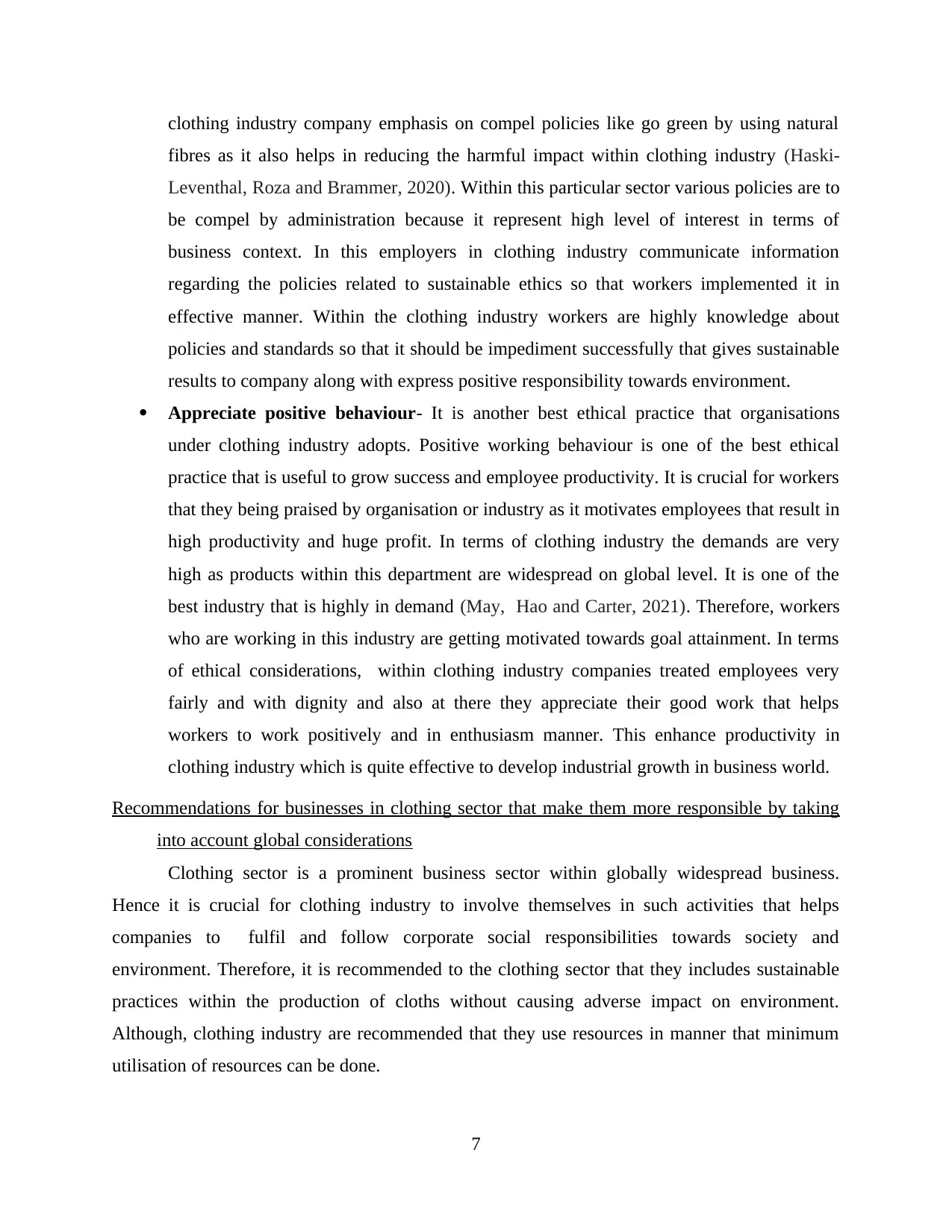
clothing industry company emphasis on compel policies like go green by using natural
fibres as it also helps in reducing the harmful impact within clothing industry (Haski-
Leventhal, Roza and Brammer, 2020). Within this particular sector various policies are to
be compel by administration because it represent high level of interest in terms of
business context. In this employers in clothing industry communicate information
regarding the policies related to sustainable ethics so that workers implemented it in
effective manner. Within the clothing industry workers are highly knowledge about
policies and standards so that it should be impediment successfully that gives sustainable
results to company along with express positive responsibility towards environment.
Appreciate positive behaviour- It is another best ethical practice that organisations
under clothing industry adopts. Positive working behaviour is one of the best ethical
practice that is useful to grow success and employee productivity. It is crucial for workers
that they being praised by organisation or industry as it motivates employees that result in
high productivity and huge profit. In terms of clothing industry the demands are very
high as products within this department are widespread on global level. It is one of the
best industry that is highly in demand (May, Hao and Carter, 2021). Therefore, workers
who are working in this industry are getting motivated towards goal attainment. In terms
of ethical considerations, within clothing industry companies treated employees very
fairly and with dignity and also at there they appreciate their good work that helps
workers to work positively and in enthusiasm manner. This enhance productivity in
clothing industry which is quite effective to develop industrial growth in business world.
Recommendations for businesses in clothing sector that make them more responsible by taking
into account global considerations
Clothing sector is a prominent business sector within globally widespread business.
Hence it is crucial for clothing industry to involve themselves in such activities that helps
companies to fulfil and follow corporate social responsibilities towards society and
environment. Therefore, it is recommended to the clothing sector that they includes sustainable
practices within the production of cloths without causing adverse impact on environment.
Although, clothing industry are recommended that they use resources in manner that minimum
utilisation of resources can be done.
7
fibres as it also helps in reducing the harmful impact within clothing industry (Haski-
Leventhal, Roza and Brammer, 2020). Within this particular sector various policies are to
be compel by administration because it represent high level of interest in terms of
business context. In this employers in clothing industry communicate information
regarding the policies related to sustainable ethics so that workers implemented it in
effective manner. Within the clothing industry workers are highly knowledge about
policies and standards so that it should be impediment successfully that gives sustainable
results to company along with express positive responsibility towards environment.
Appreciate positive behaviour- It is another best ethical practice that organisations
under clothing industry adopts. Positive working behaviour is one of the best ethical
practice that is useful to grow success and employee productivity. It is crucial for workers
that they being praised by organisation or industry as it motivates employees that result in
high productivity and huge profit. In terms of clothing industry the demands are very
high as products within this department are widespread on global level. It is one of the
best industry that is highly in demand (May, Hao and Carter, 2021). Therefore, workers
who are working in this industry are getting motivated towards goal attainment. In terms
of ethical considerations, within clothing industry companies treated employees very
fairly and with dignity and also at there they appreciate their good work that helps
workers to work positively and in enthusiasm manner. This enhance productivity in
clothing industry which is quite effective to develop industrial growth in business world.
Recommendations for businesses in clothing sector that make them more responsible by taking
into account global considerations
Clothing sector is a prominent business sector within globally widespread business.
Hence it is crucial for clothing industry to involve themselves in such activities that helps
companies to fulfil and follow corporate social responsibilities towards society and
environment. Therefore, it is recommended to the clothing sector that they includes sustainable
practices within the production of cloths without causing adverse impact on environment.
Although, clothing industry are recommended that they use resources in manner that minimum
utilisation of resources can be done.
7
⊘ This is a preview!⊘
Do you want full access?
Subscribe today to unlock all pages.

Trusted by 1+ million students worldwide
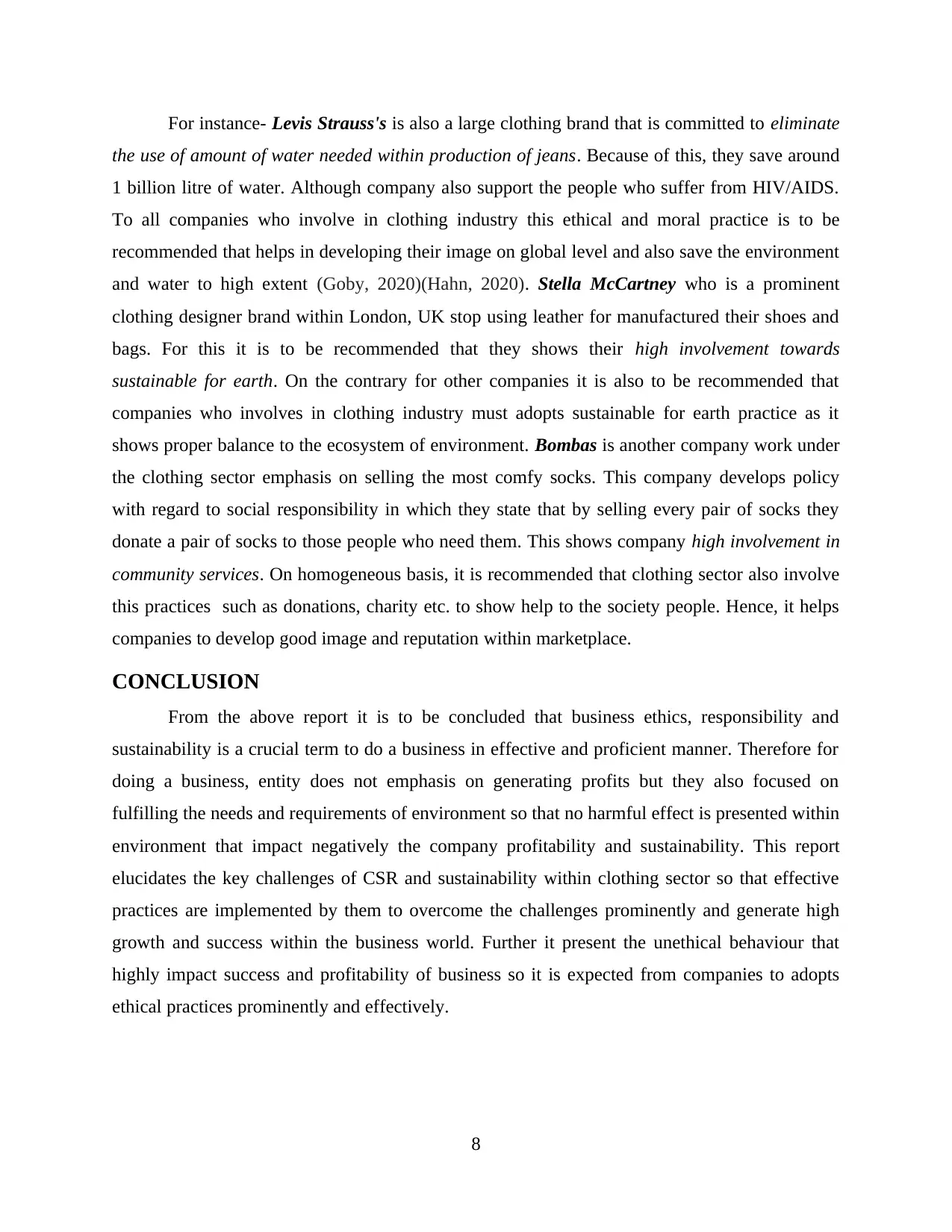
For instance- Levis Strauss's is also a large clothing brand that is committed to eliminate
the use of amount of water needed within production of jeans. Because of this, they save around
1 billion litre of water. Although company also support the people who suffer from HIV/AIDS.
To all companies who involve in clothing industry this ethical and moral practice is to be
recommended that helps in developing their image on global level and also save the environment
and water to high extent (Goby, 2020)(Hahn, 2020). Stella McCartney who is a prominent
clothing designer brand within London, UK stop using leather for manufactured their shoes and
bags. For this it is to be recommended that they shows their high involvement towards
sustainable for earth. On the contrary for other companies it is also to be recommended that
companies who involves in clothing industry must adopts sustainable for earth practice as it
shows proper balance to the ecosystem of environment. Bombas is another company work under
the clothing sector emphasis on selling the most comfy socks. This company develops policy
with regard to social responsibility in which they state that by selling every pair of socks they
donate a pair of socks to those people who need them. This shows company high involvement in
community services. On homogeneous basis, it is recommended that clothing sector also involve
this practices such as donations, charity etc. to show help to the society people. Hence, it helps
companies to develop good image and reputation within marketplace.
CONCLUSION
From the above report it is to be concluded that business ethics, responsibility and
sustainability is a crucial term to do a business in effective and proficient manner. Therefore for
doing a business, entity does not emphasis on generating profits but they also focused on
fulfilling the needs and requirements of environment so that no harmful effect is presented within
environment that impact negatively the company profitability and sustainability. This report
elucidates the key challenges of CSR and sustainability within clothing sector so that effective
practices are implemented by them to overcome the challenges prominently and generate high
growth and success within the business world. Further it present the unethical behaviour that
highly impact success and profitability of business so it is expected from companies to adopts
ethical practices prominently and effectively.
8
the use of amount of water needed within production of jeans. Because of this, they save around
1 billion litre of water. Although company also support the people who suffer from HIV/AIDS.
To all companies who involve in clothing industry this ethical and moral practice is to be
recommended that helps in developing their image on global level and also save the environment
and water to high extent (Goby, 2020)(Hahn, 2020). Stella McCartney who is a prominent
clothing designer brand within London, UK stop using leather for manufactured their shoes and
bags. For this it is to be recommended that they shows their high involvement towards
sustainable for earth. On the contrary for other companies it is also to be recommended that
companies who involves in clothing industry must adopts sustainable for earth practice as it
shows proper balance to the ecosystem of environment. Bombas is another company work under
the clothing sector emphasis on selling the most comfy socks. This company develops policy
with regard to social responsibility in which they state that by selling every pair of socks they
donate a pair of socks to those people who need them. This shows company high involvement in
community services. On homogeneous basis, it is recommended that clothing sector also involve
this practices such as donations, charity etc. to show help to the society people. Hence, it helps
companies to develop good image and reputation within marketplace.
CONCLUSION
From the above report it is to be concluded that business ethics, responsibility and
sustainability is a crucial term to do a business in effective and proficient manner. Therefore for
doing a business, entity does not emphasis on generating profits but they also focused on
fulfilling the needs and requirements of environment so that no harmful effect is presented within
environment that impact negatively the company profitability and sustainability. This report
elucidates the key challenges of CSR and sustainability within clothing sector so that effective
practices are implemented by them to overcome the challenges prominently and generate high
growth and success within the business world. Further it present the unethical behaviour that
highly impact success and profitability of business so it is expected from companies to adopts
ethical practices prominently and effectively.
8
Paraphrase This Document
Need a fresh take? Get an instant paraphrase of this document with our AI Paraphraser
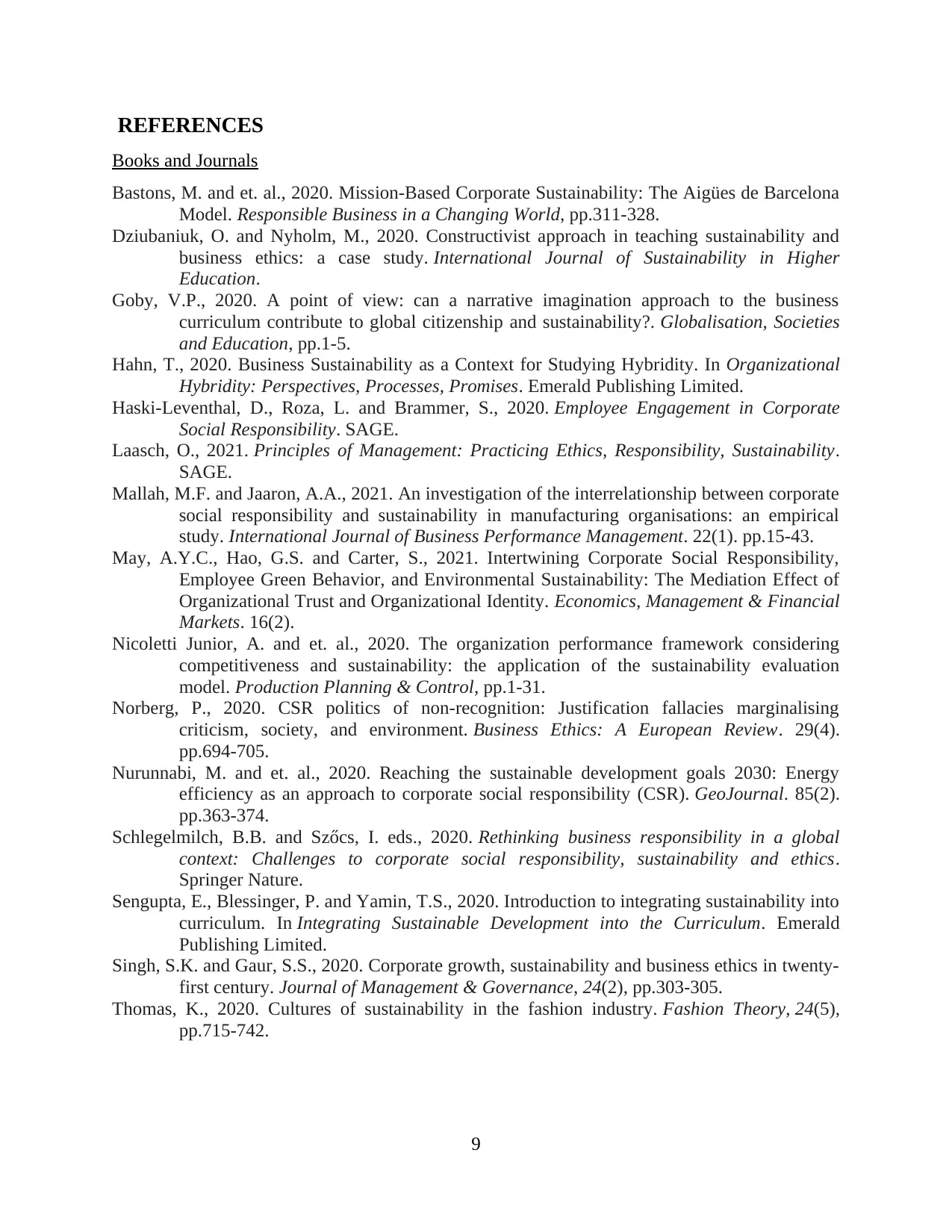
REFERENCES
Books and Journals
Bastons, M. and et. al., 2020. Mission-Based Corporate Sustainability: The Aigües de Barcelona
Model. Responsible Business in a Changing World, pp.311-328.
Dziubaniuk, O. and Nyholm, M., 2020. Constructivist approach in teaching sustainability and
business ethics: a case study. International Journal of Sustainability in Higher
Education.
Goby, V.P., 2020. A point of view: can a narrative imagination approach to the business
curriculum contribute to global citizenship and sustainability?. Globalisation, Societies
and Education, pp.1-5.
Hahn, T., 2020. Business Sustainability as a Context for Studying Hybridity. In Organizational
Hybridity: Perspectives, Processes, Promises. Emerald Publishing Limited.
Haski-Leventhal, D., Roza, L. and Brammer, S., 2020. Employee Engagement in Corporate
Social Responsibility. SAGE.
Laasch, O., 2021. Principles of Management: Practicing Ethics, Responsibility, Sustainability.
SAGE.
Mallah, M.F. and Jaaron, A.A., 2021. An investigation of the interrelationship between corporate
social responsibility and sustainability in manufacturing organisations: an empirical
study. International Journal of Business Performance Management. 22(1). pp.15-43.
May, A.Y.C., Hao, G.S. and Carter, S., 2021. Intertwining Corporate Social Responsibility,
Employee Green Behavior, and Environmental Sustainability: The Mediation Effect of
Organizational Trust and Organizational Identity. Economics, Management & Financial
Markets. 16(2).
Nicoletti Junior, A. and et. al., 2020. The organization performance framework considering
competitiveness and sustainability: the application of the sustainability evaluation
model. Production Planning & Control, pp.1-31.
Norberg, P., 2020. CSR politics of non‐recognition: Justification fallacies marginalising
criticism, society, and environment. Business Ethics: A European Review. 29(4).
pp.694-705.
Nurunnabi, M. and et. al., 2020. Reaching the sustainable development goals 2030: Energy
efficiency as an approach to corporate social responsibility (CSR). GeoJournal. 85(2).
pp.363-374.
Schlegelmilch, B.B. and Szőcs, I. eds., 2020. Rethinking business responsibility in a global
context: Challenges to corporate social responsibility, sustainability and ethics.
Springer Nature.
Sengupta, E., Blessinger, P. and Yamin, T.S., 2020. Introduction to integrating sustainability into
curriculum. In Integrating Sustainable Development into the Curriculum. Emerald
Publishing Limited.
Singh, S.K. and Gaur, S.S., 2020. Corporate growth, sustainability and business ethics in twenty-
first century. Journal of Management & Governance, 24(2), pp.303-305.
Thomas, K., 2020. Cultures of sustainability in the fashion industry. Fashion Theory, 24(5),
pp.715-742.
9
Books and Journals
Bastons, M. and et. al., 2020. Mission-Based Corporate Sustainability: The Aigües de Barcelona
Model. Responsible Business in a Changing World, pp.311-328.
Dziubaniuk, O. and Nyholm, M., 2020. Constructivist approach in teaching sustainability and
business ethics: a case study. International Journal of Sustainability in Higher
Education.
Goby, V.P., 2020. A point of view: can a narrative imagination approach to the business
curriculum contribute to global citizenship and sustainability?. Globalisation, Societies
and Education, pp.1-5.
Hahn, T., 2020. Business Sustainability as a Context for Studying Hybridity. In Organizational
Hybridity: Perspectives, Processes, Promises. Emerald Publishing Limited.
Haski-Leventhal, D., Roza, L. and Brammer, S., 2020. Employee Engagement in Corporate
Social Responsibility. SAGE.
Laasch, O., 2021. Principles of Management: Practicing Ethics, Responsibility, Sustainability.
SAGE.
Mallah, M.F. and Jaaron, A.A., 2021. An investigation of the interrelationship between corporate
social responsibility and sustainability in manufacturing organisations: an empirical
study. International Journal of Business Performance Management. 22(1). pp.15-43.
May, A.Y.C., Hao, G.S. and Carter, S., 2021. Intertwining Corporate Social Responsibility,
Employee Green Behavior, and Environmental Sustainability: The Mediation Effect of
Organizational Trust and Organizational Identity. Economics, Management & Financial
Markets. 16(2).
Nicoletti Junior, A. and et. al., 2020. The organization performance framework considering
competitiveness and sustainability: the application of the sustainability evaluation
model. Production Planning & Control, pp.1-31.
Norberg, P., 2020. CSR politics of non‐recognition: Justification fallacies marginalising
criticism, society, and environment. Business Ethics: A European Review. 29(4).
pp.694-705.
Nurunnabi, M. and et. al., 2020. Reaching the sustainable development goals 2030: Energy
efficiency as an approach to corporate social responsibility (CSR). GeoJournal. 85(2).
pp.363-374.
Schlegelmilch, B.B. and Szőcs, I. eds., 2020. Rethinking business responsibility in a global
context: Challenges to corporate social responsibility, sustainability and ethics.
Springer Nature.
Sengupta, E., Blessinger, P. and Yamin, T.S., 2020. Introduction to integrating sustainability into
curriculum. In Integrating Sustainable Development into the Curriculum. Emerald
Publishing Limited.
Singh, S.K. and Gaur, S.S., 2020. Corporate growth, sustainability and business ethics in twenty-
first century. Journal of Management & Governance, 24(2), pp.303-305.
Thomas, K., 2020. Cultures of sustainability in the fashion industry. Fashion Theory, 24(5),
pp.715-742.
9
1 out of 11
Related Documents
Your All-in-One AI-Powered Toolkit for Academic Success.
+13062052269
info@desklib.com
Available 24*7 on WhatsApp / Email
![[object Object]](/_next/static/media/star-bottom.7253800d.svg)
Unlock your academic potential
Copyright © 2020–2026 A2Z Services. All Rights Reserved. Developed and managed by ZUCOL.





